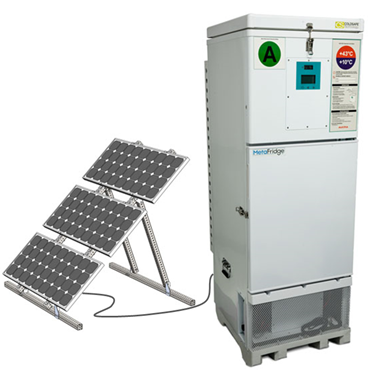The solar refrigerator is built to deliver reliable cooling solutions.
Check Out the Vital Functions of Solar Refrigerator and Their Impact on Energy Efficiency
The integration of solar refrigerator modern technology represents a considerable improvement in energy efficiency, identified by features such as sophisticated insulation and intelligent energy monitoring systems. These parts not only decrease energy loss yet also guarantee ideal performance under differing sunshine problems. Additionally, the inclusion of battery storage space remedies enables constant refrigeration, also in the absence of straight sunlight, thereby decreasing dependancy on standard electrical grids. As we analyze these necessary attributes, it comes to be apparent that their implications extend past plain performance, raising sixty-four-thousand-dollar questions regarding sustainability and long-lasting economic practicality. What exists in advance in this advancing landscape?
Understanding Solar Refrigerator Modern Technology
Solar fridge technology harnesses the power of sunlight to supply efficient cooling options, particularly in locations lacking trustworthy electrical power. By using photovoltaic or pv panels, solar refrigerators transform sunlight into electricity, which is then utilized to power the air conditioning system. This cutting-edge strategy not only decreases dependancy on conventional power sources but also dramatically lowers power costs over time.
The core parts of solar refrigerators consist of solar panels, a charge controller, batteries, and a refrigeration unit. Solar panels capture sunshine and transform it right into functional energy, while the fee controller controls the circulation of electricity to stop battery overcharging.

Trick Attributes of Solar Refrigerators
Among one of the most notable functions of solar refrigerators is their energy self-reliance, permitting customers to count on renewable sources for cooling without the need for a traditional power grid. This feature is especially beneficial in remote or off-grid areas, where traditional electrical energy gain access to is restricted or non-existent.
Solar refrigerators normally utilize solar panels that transform sunlight into electrical power, powering the refrigeration system effectively. Numerous models incorporate advanced insulation innovation, which lessens energy loss and maintains optimum temperature level degrees even when sunlight is scarce.
In addition, solar fridges are created with easy to use interfaces, permitting easy temperature level modifications and tracking. They typically include attributes such as battery storage space, enabling them to function properly throughout cloudy days or nighttime, thereby making certain constant cooling efficiency.
Durability is one more key function; created from robust products, these refrigerators are developed to withstand differing ecological conditions. Several models likewise boast green refrigerants, which add to reduced global warming possibility.
Energy Effectiveness Conveniences
Energy effectiveness stands as a considerable advantage of solar fridges, making them an enticing choice for ecologically mindful customers. By harnessing solar power, these fridges decrease reliance on conventional electrical energy resources, significantly decreasing their carbon impact. This green approach not only benefits the atmosphere however likewise straightens with international initiatives to deal with environment change.

In addition, solar refrigerators can help minimize energy wastefulness related to conventional refrigeration approaches. As they count on renewable power, there is a noteworthy decline in energy loss throughout transmission and distribution, which is usual with traditional source of power. This ingenious approach causes a more lasting power environment, ultimately promoting a cleaner, greener future. By purchasing solar refrigeration innovation, customers not only decrease their power intake but likewise add to a broader activity toward sustainable living.
Price Savings In Time
Buying a solar fridge can bring about substantial expense savings gradually, specifically as electrical energy rates remain to rise. Standard fridges count on grid electricity, which can fluctuate in cost and boost substantially as a result of rising cost of living and need. On the other hand, solar fridges harness power from the sunlight, lowering dependence on conventional power sources and providing a more stable long-term energy solution.
The initial investment in a solar refrigerator might be greater than that of a standard model; however, this expenditure is often offset by the financial savings built up via minimized electrical energy expenses. Gradually, the advancing savings can be significant, especially for houses in locations with high energy costs or those that experience frequent power outages. Furthermore, solar fridges typically need less upkeep and have longer lifespans contrasted to their standard counterparts, further boosting their cost-effectiveness.
Additionally, with developments in solar technology and lowering costs of solar panels, the roi for solar fridges continues to boost (solar continue reading this refrigerator). As consumers increasingly look for energy-efficient services, the economic benefits of solar refrigeration become a lot more pronounced, making it a sensible option for both budget-conscious and environmentally conscious individuals
Ecological Impact and Sustainability
Solar fridges present an engaging solution for lowering environmental influence and promoting sustainability. By using solar power, these devices considerably lower reliance on fossil gas, which are a primary resource of greenhouse gas exhausts. The shift to solar energy not only alleviates carbon impacts however additionally adds to cleaner air and minimized international warming capacity.
In addition, solar refrigerators commonly make use of environmentally friendly cooling agents that have minimal effect on the ozone layer contrasted to traditional refrigerants. This lines up with global efforts to eliminate compounds harmful to the environment, advertising a much more lasting refrigeration option.
Additionally, the life expectancy and durability of solar refrigerators my explanation add to sustainability. Several versions are designed with robust materials, consequently lowering the frequency of replacements and electronic waste. Their off-grid ability is especially valuable in remote or underserved areas, where reducing energy consumption and enhancing access to refrigeration can cause enhanced food safety and lowered perishing.

Final Thought
To conclude, solar refrigerators stand for a significant innovation in energy-efficient modern technology. With their ingenious features, such as innovative insulation, clever energy management, and battery storage space, these systems optimize power use while lessening reliance on traditional power sources. The advantages prolong past private cost financial savings, adding to a reduction in carbon impacts and promoting ecological sustainability. In general, solar fridges exemplify an essential action toward a cleaner and even more sustainable future in refrigeration modern technology.